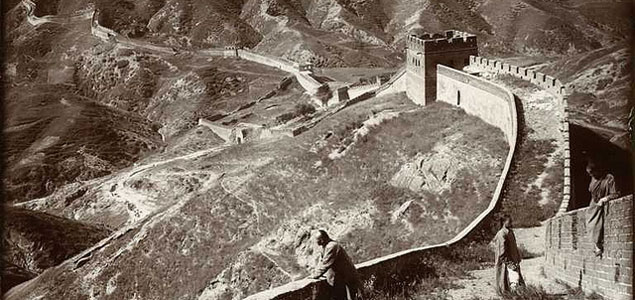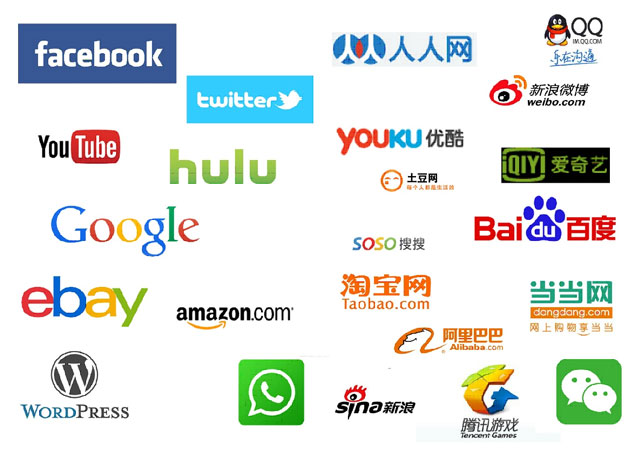
The Great Wall of China by Herbert Ponting, 1870-1935. Source: The National Archives UK
With over 564 million users, China is home to the planet’s largest network of connected citizens. The Internet was introduced in China in 1994, along with the process of reform that began after the Cultural Revolution. The economy of the socialist market consists of opening up the country to foreign capital and implementing new technologies. This policy has led to what Rodney Wai-chi Chu and Chung-tai Cheng have called “riding a double juggernaut”: the rapid, almost simultaneous capitalisation and cyberization of the country. This first part of the article explores how China’s cultural heritage, along with the strong control mechanisms that accompany the process of opening up have led to the development of ‘Chinanet’, an autonomous internet, separated from the rest of the word and characterised by a different usage that is more about performance than participation.
Over 564 million users, 331 million Ipv4 addresses, 13.4 million registered domain names, 2.69 million websites, and 442 connected mobile phones make up Chinanet, according to a 2013 report by the China Internet Network Information Centre, creating a virtually autonomous internet that is also the world’s largest network of connected users.
The Internet was introduced in China in 1994, following the opening up process that Deng Xaoping began in 1978. After the Cultural Revolution, the country found itself with a stagnant economy and a massive population, a situation that forced the rapid modernisation of the country and the opening up of the economy to foreign capital. Rural areas quickly became industrial centres, and the implementation of new technologies was promoted as the key to progress. This led to what Rodney Wai-Chi Chu and Chung-tai Cheng describe in their article “Cultural convulsions: Examining the Chineseness of cyber China” as “riding a double juggernaut”: the country’s encounter with modern capitalism and a rapid process of cyberization at almost the same time. Indeed, modernisation in China has not been a linear process, given that industrialisation and the shift towards the information society have taken place at the same time. Chu and Cheng use the example of the mobile phone: while other countries moved from domestic landlines to the ubiquitous personal communication of smartphones, in China, where limited resources made it difficult to take phone lines to remote rural areas, the mobile has been the first communication device for many citizens. This “double juggernaut”, however, is accompanied by government attempts to safeguard traditional values and the prevailing ideology, because, as Xaoping famously remarked, “when you open the window for fresh air, you have to expect some flies to blow in.” In order to prevent the harmful effects of these “flies” or any spiritual or ideological contaminating agent, the process was kept tightly controlled. More specifically, the Internet was confined within the limits of what is widely known as the Great Firewall of China – a virtual wall the separates China from the rest of the world.
1996 was the year of the Internet in China, and promotional campaigns encouraged people with slogans such as: “Buy Internet, use Internet. Get on board the ark to the next century. Win the prize of the world” and “Internet, the passport of the modern, civilised man.” But while the Internet was being presented as the hope for a new future, it was also seen by many as a hegemonic space dominated by Anglo-Saxon capitalist ideology. This is how one of the young entrepreneurs of the first internet service providers expressed it in a study carried out by Wired magazine in 1997 : “Our ideal is to create an exclusively Chinese-language network. It will be a Net that has Chinese characteristics, one that is an information superhighway for the masses.” The desire to guard against the hegemony of the English-speaking world, and against the fears unleashed by the free flow of information and the freedom of association that is inherent to the medium, led to a singular development of the Internet and of its early regulations, which were based on the government’s exclusive ownership of all internet service providers, and the strict control and identification of all users. This meant that the state was in charge of the entire implementation, international standardisation, control, and development of all aspects related to the Internet. It also meant that all connections had to be channelled through the points of access run by the Ministry of Telecommunications, and that the use of any other path of access was banned. And lastly, it meant that all organisations or individual users connected to the Internet were responsible for the content that circulated online, and had to strictly respect regulations, taking particular care to avoid spreading State secrets. To this end, all users had to sign an agreement of responsible use and a service contract, providing proof of identity including residential address and workplace details. These temporary regulations for accessing the Internet evolved into the Golden Shield project, which is popularly known as the Great Firewall of China and was set in motion by the Ministry of Public Security in 1998. The project was publicly launched in 2000 at the China Security trade fair in Beijing, three years before its full implementation. It was developed in collaboration with major international corporations including Sun Microsystems, Cisco Systems, Bay Networks, Motorola, and Canadian company Nortel Networks, among others. It is now considered the largest and most sophisticated surveillance device in the world.
This complex system combines technological, ideological and political means to work on three levels: blocking information from the Internet, coercion of online companies, and blocking specific regions or individual users.
The blocking of information is possible because the government owns and manages all the internet backbone. All the information traffic between China and the rest of the world is channelled through proxies to a single router, where it is analysed and then either blocked or redirected. This means that censorship operates by blocking IPs, DNS poisoning, and maintaining a blacklist of key words that are used to analyse data traffic.

Error screens that impede the access to the requested content in the web. Author: Sandra Álvaro.
The blocking of IPs is based on the fact that each web page is stored on a server with a unique internet protocol address. Golden Shield lists the IP addresses of certain websites – such as Facebook, for example – and prevents people from accessing them. This has the unfortunate side effect of blocking access to any other website hosted on the same server. Meanwhile DNS poisoning, also known as DNS misdirection or URL hijacking, operates at the level of the domain name system that assigns URLs, which is also under state control. When you enter an address or URL in a browser, your request is sent to a domain name server that retrieves the IP address from the server where the page is hosted. In China, the authoritarian DNS service redirects your request to a fake address, a clone of the requested URL, before it reaches the genuine server. And what you see displayed on your browser is an error message. Lastly, the third strategy is to filter the terms entered in a search, or the content of a requested website, through what is known as URL filtering and packet filtering. In this case, the content of your searches is analysed and checked against a blacklist of keywords. If more than one of these words turns up in the search or in the requested web page, the request fails and you are unable to access the content.
This system does not operate in a transparent manner. What users see is a message informing them that the server is unavailable, or that waiting time has been exceeded, so it is difficult to know if the requested content has been blocked or if there is some other problem, such as web maintenance or excessive traffic. An estimated 18,000 websites are blocked in China, including prominent news media such as nytimes.com and elpais.com, archives such as archive.org, and social networks including Facebook, Twitter, Youtube, Vimeo and Flickr. This year Instagram joined the list following the flare-up of protests in Hong Kong, and the block on Google was extended to all its services including Gmail and Google maps. Wikipedia pages that contain sensitive information are also blocked, as are certain search terms on Weibo, one of China’s most popular microblogging services. The data base of blocked sites is constantly revised, but some online services offer updated information on blocks, such as the Wikipedia entry “Websites Blocked in China” and the website greatfire.org. China Digital Times, another media outlet that is banned in China, also maintains a list of blacklisted search terms on Weibo.
Companies with an online presence that operate in China are also subject to the administrative measures that govern information and Internet services, as set out in decree no.292 of the State Council, which states that the Great Firewall forbids all foreign or domestic websites that do not comply with state policies, and that all content is liable to be checked, along with its political background. In this way the governments promotes self-censorship, making companies who want to operate in the country responsible for the content of their websites and for monitoring all the information traffic. This is done through specific filtering systems or through employees known as “Big Mamas”. As a result, search engines that operate in China, such as Yahoo and Bing, and local search engines Baidu and Soso, filter the data themselves, blocking access to any sensitive information, which simply does not appear in the search results. In the case of online content based on non-text information, sites like Youku, the largest video hosting network in the country, use a sophisticated digital footprint system that checks whether the content has been approved or blocked previously. In the case of new content, a team of people visualizes and classifies the material before it is uploaded.
Lastly, the State owns and controls access infrastructure in the physical world, and in extreme cases it can interrupt the service to a region or even to individual users.
In addition to the fact that numerous foreign services are blocked, access to non-Chinese websites is slow and often subject to interruptions. If we add the language problem, it becomes clear that browsing beyond the domain of China is not a very attractive option for users. In fact, only six percent of the hyperlinks that appear in Chinese websites point outside of the Chinanet space. This isolation has favoured the massive growth of local services that replace inaccessible international services. Many of these Chinese versions are developed by young entrepreneurs who have spent time in Silicon Valley. These “sea turtles”, as they are popularly known, have been able to successfully adapt foreign technologies to the characteristics of the Internet in China.
Google, for example, tried to establish itself in China in 2006, accepting the government’s censorship conditions, a highly controversial decision that led the company to move to Hong Kong in 2010. That same year, the giant search engine was blocked in China, followed by all its associated services in 2014. But even before it was banned, Google had already lost the battle to its local competitor Baidu. Founded by the entrepreneur Robin Li on his return to China from Silicon Valley, Baidu was set up with an initial investment from Google, but gradually became completely independent and began to offer an increasingly large number of services. These include a wiki similar to Wikipedia (baike.baidu.com), a blog hosting service (hi.baidu.com), a news platform (zhidao.baidu.com), platforms for sharing music (music.baidu.com) and videogames (youxi.baidu.com), and its own GIS, Baidu Map. One of the most popular services is the open discussion forum called Post Bar. Although Baidu is not alone, and there are also other popular search engines in China such as Soso.
Youtube was blocked in 2009 and was replaced by the platforms Tudou and Youku. Youku, which literally means “what’s the best what’s the most cool” was founded in 2006 by another “sea turtle”, Victor Koo, and has become the world’s largest video hosting platform, with 90% of its target audience in mainland China. Unlike Youtube, Youku hosts a large selection of syndicated videos from traditional media. Young people go to the platform looking for an alternative to the meagre and overly ideologised television programming and the censored films released in the country. The most-watched content is short videos such as film trailers and television series, mainly produced in Korea. User-created videos are a minority, but they have their own space on Youku Paike. Other multimedia platforms – like Hulu, for example – also have their Chinese versions, in this case Iqiyi.
As for social networks, Facebook has been replaced by RenRen, which is one of the largest media sites with over 31 million active users. And although Twitter is blocked, China also has its own microblogging platforms including Tencent QQ and Sina, which includes the popular Weibo, that means microblog in Chinese, one of the most popular sites with over 50 million users. Familiar popular blog hosting services like Blogger and WordPress are not available in China either, and the gap has been filled by similar services offered by Baidu, Tencent and Sina.
And now we come to the China’s most popular service, instant messaging, which has over 461 million users. Although Whatsapp and other international services are accessible, there is a Chinese version called WeChat. WeChat is an essential mobile app for anybody who wants to be wired in China. As well as instant messaging, it provides other social media services such as a user profile and an album that can be shared with contacts, account subscriptions, a geolocalisation service that sends the user’s position and searches for possible contacts in the area, and entertainment features including a large selection of “stickers” and a tangible computing app called “shake” that detects the movement of the phone and sends a signal to a contact’s phone, so that both users shake their mobiles in unison. WeChat, which channels more than 77% of instant messages, is owned by Tencent, China’s largest internet company. The success of Tencent, founded by 35-year-old entrepreneur Pony Ma, is based on its accurate assessment of how citizens use the Internet in China. As well as owning the most popular service, the company also offers a mass news portal, thousands of online games, forums, blogs, microblogs, and all the services that net-citizens – mainly young people who use their smartphones to go online – demand.

On the left, international services. On the right, substitutes of these services in China. Author: Sandra Alvaro
And lastly, e-commerce is another service that is on the rise in China. While the popular user-to-user trading platform Ebay is accessible in China, it has nowhere near the number of users of its local competitor Taobao, which is part of the world’s largest online bazaar of export products, Alibaba, founded by Jack Ma. Amazon also has a Chinese competitor in DangDang. Groupon, on the other hand, does not have a competitor, but this is because China has a different model of discount shopping called tangou or group shopping, in which several Internet users from a particular city who are interested in the same product look for a retailer who will offer them a discount for a joint purchase.
The success of these companies offers an insight into the profiles and usage habits of Chinanet users. As well as being separate from the rest of the world and under tight control, the Chinese internet is also characterised by the prevalence of young users – almost 60% are under thirty, and 80% are under forty – most of who use their smartphones to go online (75% of users connect via mobile phone). In other countries, users tend go online in search of information, personal promotion and contacts, and email remains among the most popular services, which means that work and leisure converge in the same medium. But in China the Internet is rarely considered to be a working tool – only 32.4% of users connect at work – and is seen more as a playground. The entertainment superhighway.






Leave a comment